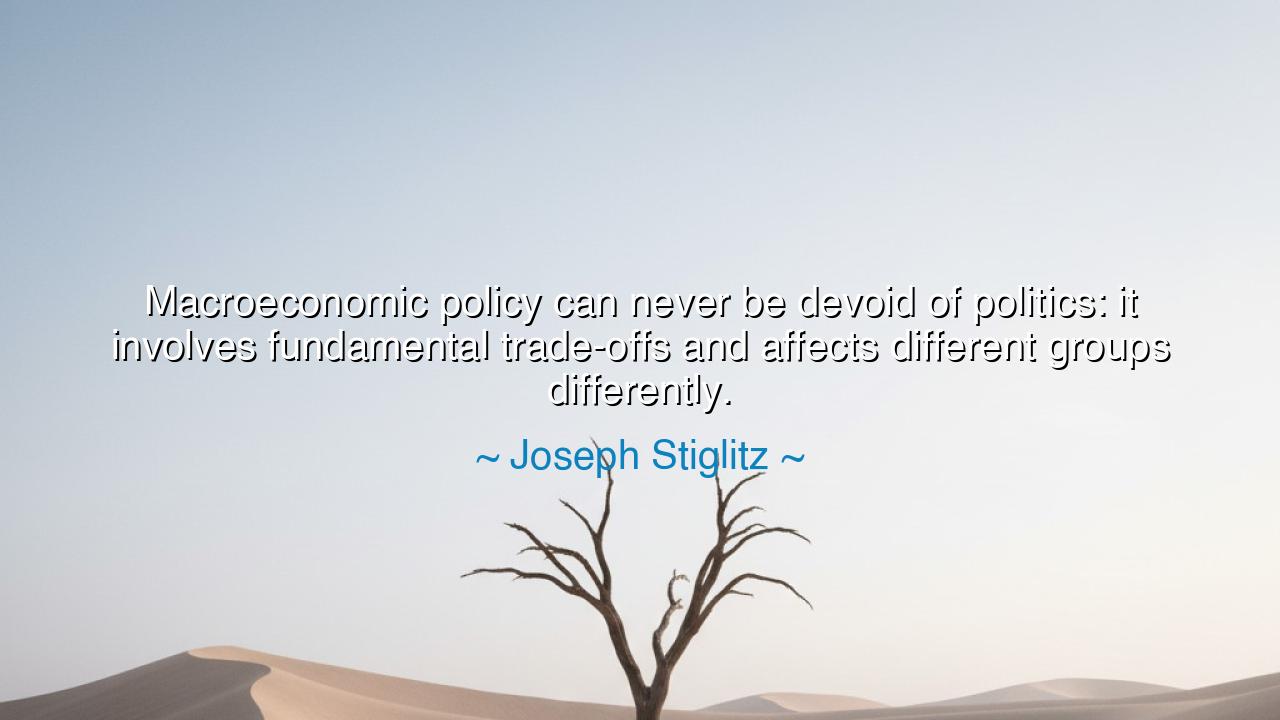
Macroeconomic policy can never be devoid of politics: it
Macroeconomic policy can never be devoid of politics: it involves fundamental trade-offs and affects different groups differently.






The words of Joseph Stiglitz cut through the veil of illusion with the sharpness of truth: “Macroeconomic policy can never be devoid of politics: it involves fundamental trade-offs and affects different groups differently.” In this single line he strikes down the false dream that economics is merely numbers, formulas, and lifeless calculations. He reminds us that behind every decision of finance and law are human beings—some raised, some lowered, some enriched, some impoverished. To act in economics is to act in politics, for it touches not only markets, but the beating heart of society.
Consider what is meant by trade-offs. When rulers choose to raise taxes, they strengthen the treasury but burden the people. When they lower them, they bring relief but weaken the state’s coffers. When interest rates rise, savers rejoice but borrowers despair; when they fall, investors gain but pensioners lose. Every choice is a scale that tips toward one group and away from another. Thus, as Stiglitz declares, economics cannot be pure or detached—it is always soaked in the struggles of justice, power, and inequality.
History offers endless mirrors of this truth. Think of the Great Depression of the 1930s. Governments across the world debated how to respond: should they cut spending to preserve gold, or expand spending to save the hungry? Each path favored different classes—creditors or debtors, the rich or the poor, the cities or the countryside. Franklin Delano Roosevelt, in launching the New Deal, did not merely shift economic numbers; he shifted the balance of power, lifting the working class while challenging entrenched elites. His macroeconomic policies were politics in action, for they rewrote the covenant between government and the governed.
The Roman Empire, too, reveals this truth. Grain subsidies for the poor, land grants for soldiers, taxes for provinces—these were not abstract numbers. They were decisions that fed some and starved others, that kept the mob loyal while burdening the provinces with tribute. Each policy was a negotiation of politics, ensuring survival for some, resentment for others. Rome endured for centuries not through pure economic design, but through the art of balancing these trade-offs among its many peoples.
Stiglitz also reminds us that every policy “affects different groups differently.” This is a call to humility and vigilance, for it is easy to proclaim a policy wise when it benefits oneself, while ignoring its harm to others. The cutting of social programs may ease the burden of the wealthy, but it deepens the pain of the poor. The printing of money may rescue industries, but it may also erode the savings of laborers. To rule justly, one must see not only one’s own group, but all groups, and weigh their destinies in the balance.
The lesson, O seeker, is profound: do not be deceived when leaders or scholars speak of economics as if it were neutral, objective, or cold. Behind the veil of numbers, there are always choices—choices of who shall rise and who shall fall, who shall carry the burden and who shall be freed from it. To understand economics, you must understand politics, and to understand politics, you must understand the hearts and struggles of people.
Practical wisdom flows from this: in your own life, when you hear of policy, ask not only “Will it help the economy?” but “Whom does it help, and whom does it harm?” Train yourself to see the hidden winners and losers in every decision. Support leaders who acknowledge these trade-offs honestly, not those who pretend their actions are without consequence. And in your own dealings, whether great or small, seek fairness, for the measure of justice is not how you fare, but how all fare together.
So let Joseph Stiglitz’s words echo as both reminder and warning: “Macroeconomic policy can never be devoid of politics.” For numbers may seem silent, but they speak loudly in the lives they shape. Every coin is a choice, every policy a turning of the wheel of power. Remember this, and you will not be blinded by the mask of neutrality, but will see the truth: that economics is not only about markets, but about humanity itself.






TDTan Duy
I completely agree with Stiglitz’s view that macroeconomic policy isn’t free from politics, but I also think it’s important to ask: how can we make sure that the trade-offs made are transparent and understandable to the public? Often, people don’t see the full effects of economic decisions until it’s too late. How can we make these policies more inclusive and ensure the public is part of the conversation about these trade-offs?
GNNguyen Gia Nhu
This quote makes me wonder about the way macroeconomic policies are framed and who they’re really meant to help. It seems like certain policies, while seemingly neutral, actually favor specific groups more than others. Does this mean that economic policies are inherently biased, or is it just that some groups have more power to influence policy decisions? Could we ever create a more equitable system where all groups benefit?
VNvy nguyen
It’s interesting how Stiglitz links politics with macroeconomic policy. I guess it makes sense since economic decisions impact the distribution of wealth, and that’s always political. But how do we ensure that these decisions are made with fairness, especially when powerful groups are involved? Can macroeconomic policies ever be truly neutral, or will politics always play a role in shaping the outcomes?
TPPhan Tan Phong
Stiglitz’s point seems to highlight the inherent conflict in macroeconomic policy decisions. When you make a policy that benefits one group, it often comes at the expense of another. Do you think it’s possible for policymakers to truly make decisions that benefit society as a whole, or is it always going to be a balancing act between different groups with conflicting interests? How do we strike a fair compromise in such situations?